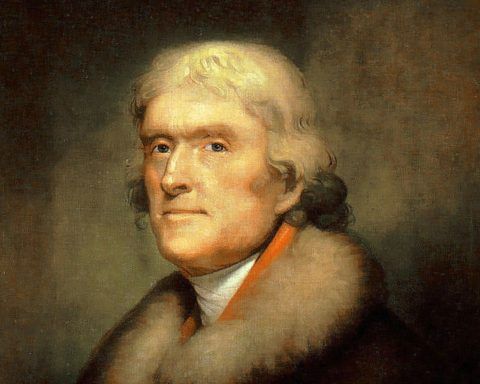When George Orwell first heard about Josef Stalin’s Purge Trials, he immediately believed them to be rigged. It wasn’t so much the inconsistencies and fantasies of the prosecution (one of the charges lodged at these supposed Russian conspirators with Hitler to overthrow the Stalin regime had the traitors meeting with Nazis at a hotel that didn’t exist anymore) but the heavy-handed propaganda voiced by the regime. Even though the accused “admitted” their complicity with the Trotsky/Hitler cabal–it was later discovered that they were drugged and tortured into confessing–Orwell astutely saw them as a monstrous frame-up because he “felt” it in the crudeness of the language.
But an American lawyer sitting in the audience during the Trials, supposedly well-versed in logic, was fooled, or wanted to be. Joseph Davies, FDR’s ambassador to the Soviet Union during the height of the Trials defended the verdict despite accepting that some of the testimony of the accused was not true. Nevertheless, Davies hewed to the overall verdict that even Lenin’s Old Bolsheviks, along with the Army, sanitation workers, regular citizens, and a woman who dared to dance with a visiting Jazz band, had conspired with the Nazis and Stalin’s hated Trotsky to take over the “socialist motherland.” Davies based this on the transparently false testimony of the accused: “Here there was no issue left–the guilt had already been determined by the confessions of the accused.”
Four years later, months after the Nazi invasion of Russia and a few weeks after Pearl Harbor, Davies wrote a book, Mission To Moscow (1941) in which he even more emphatically peddled the guilt of the accused. In passages that could have been written by the Comintern, Davis stated that Stalin was not trying to murder off his communist opposition but to protect the country from home-grown fascists:
[The Purge Trials] “were part of a vigorous and determined effort of the Stalin government to protect itself not only with revolution within but from attack without.”
But Davies wasn’t content with just writing about the Purge Trials; he wanted his book visualized in the form of a major Hollywood film. He approached the studio who was the most liberal in tinsel-town, Warner Brothers.
In a decision that Warners later had to spin their way out of, the studio made the film with an A class budget. Veteran actor Walter Huston was cast as Davies and the film depicted the accused with the propaganda of the Stalin regime.
But there were contrary voices within the studio. The film’s producer, Robert Buckner, had a “violent argument with Davies” because Buckner believed that the Purge Trials were a frame-up. After witnessing the trial scenes depicting the Stalinist version, Buckner stated:
“I did not believe that the victims of the so-called Purge Trials were guilty as charged…I am convinced Stalin framed them.”
Buckner’s view was no gut reaction but was arrived at after a careful study of the trial transcripts. But Jack Warner would not listen, and with Davies on a mission, the film was made, which not only defended the Purge Trials but also asserted that the Soviets had invaded Finland in 1940 because the tiny”fascist” country was about to invade Russia. Amazingly, the film even contained a scene with Trotsky meeting with the Nazis.
When the film was released in 1943 there was a chorus of approval from film critics, with many adopting the language of Stalin, by declaring those opposed to the film were Trotskyites. But there was a dissident voice. Film critic James Agee saw through the propaganda of the film, stating that the production was “a mishmash: of Stalinism with New Dealism with Hollywoodism with journalism with opportunism…all mosaicked into a remarkable portrait of what the makers of the film think that the American public should think the Soviet Union is like.”
Others who had a spent nearly a decade attacking Stalin as a murderer were activated by the film’s premise. John Dewey, who dared during the Purge Trials to give Trotsky a forum by which to defend himself from the charges, along with other anti-Stalinists, denounced the film as “the first instance in our country of totalitarian propaganda for mass consumption.”
Anti-Stalinists organized in protest against the film, and amazingly, Jack Warner dismissed them in the language of the Kremlin. In a message intended for FDR, Warner attacked those protesting as a “Trotskyite Bloc.”
After the war, and with the Cold War heating up, Warner disingenuously asserted that the film’s premise was not “pro-Communist at the time,” and the film was made at the request of the White House.
But for those who assert that FDR was in point of fact anticommunist, and not, as asserted by right-wingers, soft on Stalin,
the president’s view of both the book and the film was damning.
At a special White House screening of the film, Roosevelt was visibly supportive. Even before the film was made, FDR expressed his private thoughts in the inside copy of Davies’ book: “This book will last.”
Unfortunately for those dwindling view who still support the Stalin version of the Purge Trials (while a graduate student in the 90s the book was recommended to me by a pro-Stalin professor) neither the book or the film (which is rarely shown on TV) has endured.







The film shows up on TCM from time to time, but it’s a bizarre and awkward experience.